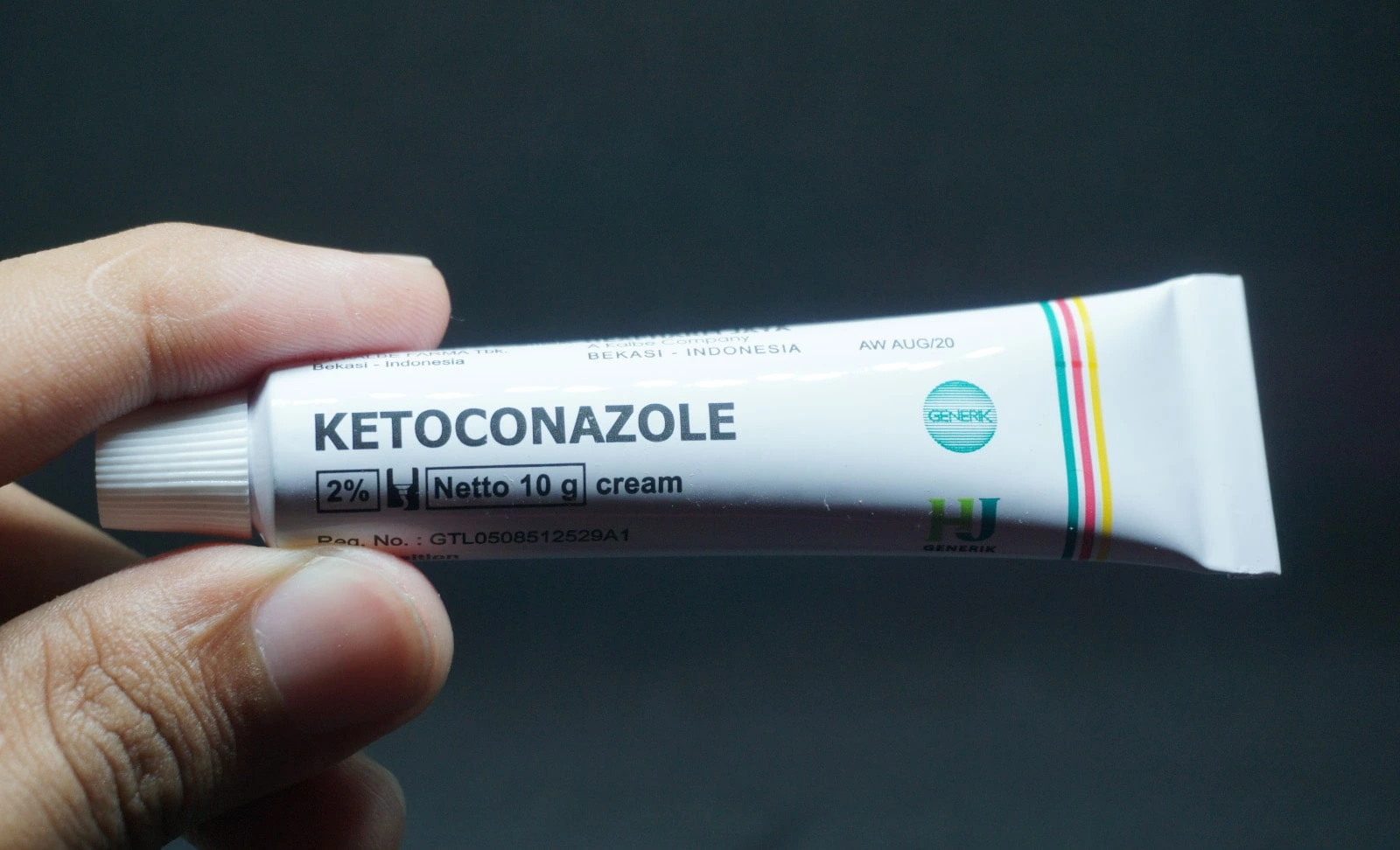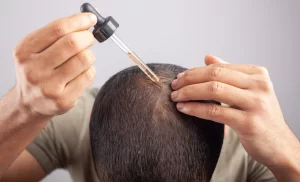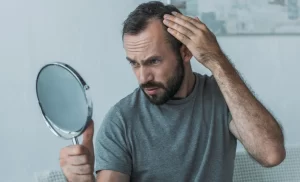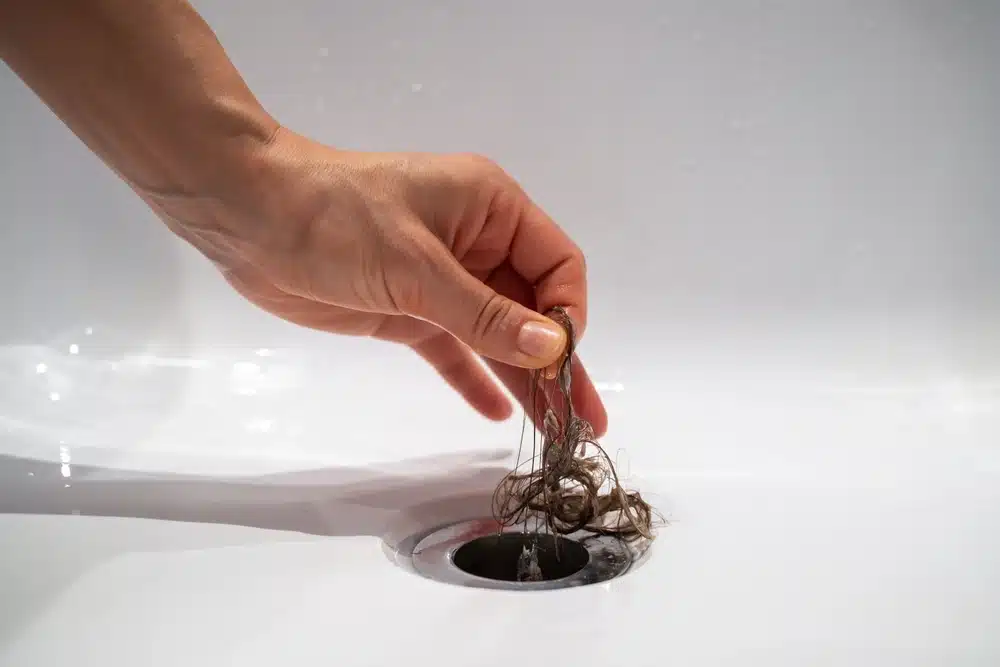If you’ve ever looked in the mirror and noticed you have less hair than before or pulled a few too many strands from the shower drain, you have likely also looked into hair restoration solutions. Hair loss is unfortunately prevalent – especially in men (although it also affects women), but that doesn’t mean you have to give in.
One hair loss solution that might prove effective is ketoconazole. Does it work, though?
What is Ketoconazole?
Ketoconazole is an antifungal medication that’s used to treat fungal infections, such as:
- Ringworm
- Yeast Infections
- Athlete’s Foot
- Jock Itch
- Dermatitis
It usually comes in the form of a cream, but you can also get it as a shampoo for fungal infections that affect the scalp (like seborrheic dermatitis). It’s not primarily marketed for anything other than treating fungal infections. However, people still use it to treat hair loss – we’ll go into why shortly.
Is Ketoconazole the Same as Nizoral?
You might hear ketoconazole described as Nizoral. Ketoconazole is the antifungal ingredient, while Nizoral is the brand of medication. So, if you’re looking to get ketoconazole, you would likely purchase Nizoral, which contains it. You can find Nizoral shampoo containing either 1% or 2% of ketoconazole – the best one for you, depending on the fungal infection’s severity.
Do People Use Ketoconazole for Hair Loss?
Yes. While Ketoconazole is often prescribed for fungal infections, many people take on board the evidence that it helps the hair regrow and use it as part of their hair care routine.
Ketoconazole for Hair Loss: Does it Work?
The research into ketoconazole for hair loss is still in its infancy – hopefully, as more scientists research the topic, there’ll be more concrete evidence of the effect of ketoconazole on hair loss. Still, some studies have shown the effectiveness of ketoconazole for hair loss.
One study [1] compared the effectiveness of finasteride, dutasteride, and minoxidil with Rogaine foam, Propecia, and ketoconazole for treating male pattern baldness. The results showed that all patients had hair regrowth during the study, indicating that ketoconazole plays a role in hair restoration. Many other studies [2] have shown the effectiveness of this treatment, with studies being done on both animals and humans showing promising results of hair growth and increased hair shaft diameter.
How Does it Work?
As we said before, there’s no concrete evidence about how ketoconazole works for hair loss; however, a study did show [1] that it blocked the production of the hormone DHT. DHT is a hormone and androgen that is found in men and is often linked to male pattern baldness. By blocking the production of it, you can prevent, stop, and even reverse hair loss.
How to Use Ketoconazole for Hair Loss
The best way is to use Ketoconazole shampoo for hair loss, which you can use in the shower like a normal shampoo. Remember to always read the instructions on the back of the bottle for the best effects and to avoid damaging your scalp and hair. Usually, this means following a typical shampoo routine of wetting the hair, lathering, and washing out. You can condition your hair as usual after use.
How Long Does It Take Ketoconazole Shampoo to Work?
For fungal infections, the shampoo takes around 2 to 3 weeks to clear it up. However, if using ketoconazole for hair loss, expect to wait a little longer – hair restoration medications usually take at least four months for users to witness results.
What Are the Side Effects of Ketoconazole?
Most medications come with side effects, and it’s essential to be aware of the ones from ketoconazole before using it. These include:
- Itchiness
- Irritation
- Stinging
- Burning
- Hair Changes (like colour and texture)
- Hair Loss
Yes – using ketoconazole could even become one of the factors in hair loss. However, this is rare; most people do not experience these adverse effects. To play it safe, stop usage if you notice any of these symptoms.
Why Would Ketoconazole Cause Hair Loss?
It’s not 100% known why ketoconazole can cause hair loss or thinning in some people, but it’s generally accepted that it’s likely due to telogen effluvium. Telogen effluvium is a type of temporary hair loss that causes sudden shedding and is caused by sudden stress or shock. It is completely reversible, so stopping the use of ketoconazole if it has this effect on you will mean your hair grows back later.
Should You Use Ketoconazole?
With studies showing the promising effects of ketoconazole shampoo for hair loss, you might wonder, is it something you should try? If you tick off these boxes, it’s definitely worth a go:
- You Are a Man
Unfortunately, there isn’t as much evidence to show that ketoconazole helps women regrow their hair in the same way as men. That’s because the basic science behind ketoconazole for hair loss is that it blocks the production of the male hormone DHT, in turn preventing hair loss. However, some of ketoconazole’s inflammatory properties might still help women boost scalp health [3] (and thus promote healthy hair growth).
- You’ve Noticed Hair Loss
If you’ve noticed your hair starting to fall out, you’ll likely be on the lookout for a hair restoration solution, and ketoconazole might just be the medication that works best for you. With how much male pattern baldness can destroy a person’s confidence, it helps to try out methods that really could work.
- You Have a Seborrheic Dermatitis
The primary reason people use ketoconazole is for fungal infections like seborrheic dermatitis. If you have this fungal infection on the scalp, getting Nizoral is definitely a good idea, as it can help clear the fungal infection up while contributing to hair regrowth.
Don’t forget the potential side effects of ketoconazole. While you likely won’t experience hair loss after using it, it could still happen. Always stop using and consult a dermatologist if you experience any adverse effects after shampooing with ketoconazole.
Other Hair Loss Solutions on the Market
If you’ve not yet tried any other hair loss solutions, you might want to test them out before giving ketoconazole a go – especially because there are some medications that are specifically marketed towards hair loss (whereas ketoconazole is for fungal infections). These medications have much more evidence and publications to back up their effectiveness.
- Minoxidil
Topical minoxidil is a common treatment option for male pattern hair loss. You need to use it every day, and it should take between 4 and 6 months to see good results. Many people with androgenetic alopecia find this medication an incredible solution, and it saves them the stress of dealing with losing their hair early. Keep in mind that you can’t stop taking minoxidil if you want the results to continue – those who suddenly stop taking the topical treatment find that their hair goes back to how it was.
- Finasteride
Finasteride is another common treatment for hair loss. This one is usually taken orally and has similar results to topical minoxidil, and much like minoxidil, you need to keep taking finasteride for results to last. Some people like to mix both finasteride and minoxidil for better results, and it often works well.
- Natural Oils
There is some evidence that certain oils can help you regrow hair, with two of them being rosemary oil and pumpkin seed oil. Using these regularly (and letting them sit on the hair for a while) may promote hair growth enough to restore your confidence.
What About FUE Hair Transplants?
Sometimes, topical medications and oils aren’t enough. In cases of more extensive hair loss, you need a different solution, and that’s where hair transplants come in.
The FUE hair transplant uses modern technology to restore hair growth. By taking follicles from a healthy donor section of the hair, the surgeon can transport that to the patchy/thinning/balding area. After the hair transplant procedure, the hair will begin to grow in that section, leading to a full head of hair. For those who don’t have much luck with medications or shampoos, it’s an excellent route. Get in touch with the team at Harley Street Hair Clinic if you’re interested in a consultation!
In a Nutshell
While Ketoconazole is not marketed as a hair loss solution, that doesn’t mean it won’t work as one, and many people find it very effective at restoring hair growth. It works best for male pattern baldness; you’ll need to use it consistently to see results. Remember – there are other options if ketoconazole doesn’t work for you, such as hair-growing medications like minoxidil and finasteride.
Sources:
- Pilot Study of 15 Patients Receiving a New Treatment Regimen for Androgenic Alopecia: The Effects of Atopy on AGA
- Topical ketoconazole for the treatment of androgenetic alopecia: A systematic review
- THE ANTIINFLAMMATORY EFFECTS OF KETOCONAZOLE – A COMPARATIVE-STUDY WITH HYDROCORTISONE ACETATE IN A MODEL USING LIVING AND KILLED STAPHYLOCOCCUS-AUREUS ON THE SKIN OF GUINEA-PIGS




